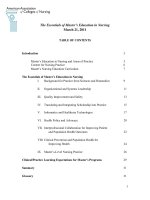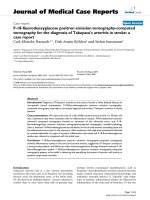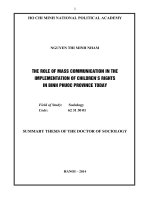The making of tocqueville’s democracy in america
Bạn đang xem bản rút gọn của tài liệu. Xem và tải ngay bản đầy đủ của tài liệu tại đây (2.08 MB, 440 trang )
The Making of Tocqueville’s
Democracy in America
Tai Lieu Chat Luong
s
James T. Schleifer
The Making of Tocqueville’s
Democracy in America
Second Edition
s
j a m es t . sc h leifer
Liberty Fund
indianapolis
This book is published by Liberty Fund, Inc., a foundation established
to encourage study of the ideal of a society of free and responsible
individuals.
The cuneiform inscription that serves as our logo and as the design motif
for our endpapers is the earliest-known written appearance of the word
“freedom” (amagi ), or “liberty.” It is taken from a clay document written
about 2300 b.c. in the Sumerian city-state of Lagash.
q 2000 Liberty Fund, Inc. All rights reserved
First published in 1980 by the University of North Carolina Press
Printed in the United States of America
04 03 02 01 00 c 5 4 3 2 1
04 03 02 01 00 p 5 4 3 2 1
Library of Congress Cataloging-in-Publication Data
Schleifer, James T., 1942–
The making of Tocqueville’s Democracy in America.
p.
cm.
Includes bibliographical references and index.
isbn 0-86597-204-4 (hardcover: alk. paper).
isbn 0-86597-205-2 (pbk.: alk. paper)
1. Tocqueville, Alexis de, 1805–1859. De la de´mocratie en
Ame´rique. I. Title.
jk216 in process
306.280973—dc21
99-25721
Liberty Fund, Inc.
8335 Allison Pointe Trail, Suite 300
Indianapolis, Indiana 46250-1684
to alison, kate, and meg
Mary Mottley, Tocqueville’s future wife (ca. 1830)
(Courtesy of George W. Pierson)
Alexis de Tocqueville (ca. 1830)
(Courtesy of George W. Pierson)
Contents
s
List of Illustrations
Foreword by George W. Pierson
Preface to the Liberty Fund Edition
Preface to the First Edition
xi
xiii
xix
xxi
part i
Tocqueville’s Second Voyage to America, 1832–1840
1. The Writing of the First Part of the Democracy
2. An Expanding Task Resumed
3
23
part ii
How to Account for America? Tocqueville Looks
at Some Particular Causes Physiques
3. An Hypothesis Weighed and Rejected
4. Further Considerations of Environment
5. Was Race a Sufficient Explanation of the American
Character?
6. The Transformation of a Continent
49
65
82
97
part iii
Tocqueville and the Union: The Nature and Future
of American Federalism
7. The Bond between the States and the Central
Government
115
x
Contents
8. A Prophet in Error
9. How Large Might a Republic Be?
135
149
part iv
Democracy, Centralization, and Democratic Despotisms
10.
11.
12.
13.
Centralization and Local Liberties
Where Would Power Accumulate?
Administrative Centralization and Some Remedies
Tocqueville’s Changing Visions of Democratic Despotism
161
185
203
221
part v
Democracy, the Individual, and the Masses
14.
15.
16.
17.
18.
The Tyranny of the Majority
The Tyranny of the Majority: Some Paradoxes
Would De´mocratie Usher in a New Dark Ages?
Democratie and Egoăsme
From Egoăsme to Individualisme
241
265
279
290
305
part vi
What Tocqueville Meant by De´mocratie
19. Some Meanings of De´mocratie
20. Tocqueville’s Return to America
325
340
Epilogue: How Many Democracies?
Selected Bibliography
Index
354
369
387
Illustrations
s
Mary Mottley
v
Alexis de Tocqueville
vi
A page of the original working manuscript
14
M. le Comte Herve´ de Tocqueville
18
Gustave de Beaumont
19
Title page of De la De´mocratie en Ame´rique, 1835
20
Alexis de Tocqueville
24
From the “Rubish”
26
The Tocqueville Chaˆteau
27
Demander a` G. [Gustave] et L. [Louis]
43
Foreword
s
Tocqueville? In this second half of the twentieth century—in our age
of social anxieties and national self-questioning—thoughtful people
have been turning more and more to the complex but extraordinarily illuminating work that the young Frenchman, Alexis de Tocqueville, composed about us almost a century and a half ago.
This work was entitled Democracy in America (De la De´mocratie
en Ame´rique), and it appeared, as we know, in four volumes. The
first two volumes, published in 1835 and translated in England and
republished in an American edition in 1838, described and analyzed
the American experiment with a clarity, balance, and penetration
that were astonishing, and with an overall approval that surprised
and delighted American readers. Overnight they became classic and
were printed and reprinted, with editions for use in our schools. The
second two volumes, only finished and translated in 1840, seemed to
focus on equality, or egalitarianism in the modern world, at least as
much as on American democratic self-government. Obviously they
were philosophic and more remote. Less obviously, we were not culturally ready to assimilate Tocqueville’s pioneering projections into
the psychology and sociology of the masses. We regarded ourselves
as exceptions, as under a special destiny. So volumes three and four
were accepted, but much less read.
Then times changed. After the Civil War, as nationalism replaced
federalism, and as industrialism took over and the cities grew, Tocqueville’s institutional descriptions of what had been an agrarian republic (volumes one and two) became more and more out of date, while
xiv
Foreword
his anxieties about the democratic masses (volumes three and four)
appeared to have been refuted by the dazzling expansion and prosperity of the nation. In 1888 James Bryce published his American
Commonwealth. And in short order this new classic replaced the old
Democracy in schools or private libraries.
So Tocqueville was almost forgotten—but has now been revived.
A part of the Tocqueville revival (which began about 1938 and
which bids fair to continue for many years) was the rediscovery of
the Democracy in America, and especially of the second two volumes.
What Tocqueville had had to say about American materialism and
money-mindedness, about the cultural shallowness of an activist and
problem-oriented society, about the instincts and jealous mediocrity
of the masses, about the tyranny of the majority and suffocation by
sheer numbers, about what wars might do to substitute centralization for freedom, or about the risks of despotism from a democratized bureaucracy, or about the loss of private energy in a welfare
state—indeed about an astonishing range of contemporary discomforts and anxieties—rather suddenly and irresistibly, after the Great
Depression and World War II and the disillusionments of our worldwide responsibilities, came to seem prophetic, and not only prophetic
but challenging and profoundly instructive. So the De´mocratie has
been partially or wholly retranslated in two important new editions,
has reentered the curriculum in our colleges and universities, and is
resorted to and quoted by writers of all parties and persuasions (see
the able analysis by Robert Nisbet, “Many Tocquevilles,” in American
Scholar, winter 1976–77).
A second element contributing to the Tocqueville revival on both
sides of the Atlantic has been the recovery, publication, and study of
a fascinating variety of Tocqueville and Tocqueville-related manuscripts. This began with the discovery of the existence of the U.S.
travel notes and diaries and letters home of Alexis de Tocqueville and
his friend and traveling companion Gustave de Beaumont. These
were first used in my Tocqueville and Beaumont in America and have
now in considerable part been printed in the Oeuvres comple`tes d’
Alexis de Tocqueville: a still-growing edition which since 1951 has been
in the process of republishing all of Tocqueville’s works, together with
his published and unpublished papers and conversations and letters.
Recently the head of the editorial working committee, Andre´ Jardin,
and I have also brought out Beaumont’s Lettres d’ Ame´rique, 1831–
Foreword
xv
1832. And over the years a collection has been forming at Yale which
includes not only the many other surviving Beaumont documents
but copies of lost Tocqueville materials and the original drafts and
the working manuscript of the Democracy itself. So there has come
into existence, or been recovered, a wide and informative range of
materials on the background, circumstances, composition, and reception of Tocqueville’s masterpiece.
Rediscovery of Tocqueville—recovery of his papers—yet there has
been one thing missing. Critics and commentators have reread him.
Scholars and students have been focusing on particular aspects of
Tocqueville’s life, his experiences in England or the revolution of 1848,
his religious beliefs or his social and political thought—almost to
the point of generating a small but flourishing Tocqueville industry.
Yet up until now no one has had the courage to tackle the great volume (I should say the formidable mass) of Tocqueville’s difficult and
sometimes almost indecipherable notes and drafts and essays and
working manuscript for his celebrated masterpiece—to find out how
and why it was put together. This study of the manufacture, or rather
of the creation, of the Democracy is what James T. Schleifer has attempted, and with impressive results.
The first clear gain for students of Tocqueville and of his De´mocratie is a many-sided enlargement of our information. Schleifer shows
not only when Tocqueville wrote the different parts of his book—
and where and under what influences or pressures of circumstance—
but what books he read, or used, or rejected—whose conversations
and ideas most influenced him—whom he consulted for substance
or for style—how his four volumes began and grew and gradually
shifted in focus—but also what difficulties the author encountered
and what frustrations. With Schleifer’s aid each of us will make his
own discoveries, both great and small. I found Tocqueville’s (here
documented) use of the Federalist Papers, and his borrowings or rejections of James Madison, particularly illuminating. Schleifer will
surprise many by his demonstration that Tocqueville paid considerably more attention to the American economy than I and others have
supposed. Schleifer not only confirms Tocqueville’s multiple meanings for his key themes of democracy, individualism, centralization,
and despotism, and demonstrates the confusion that sometimes resulted, but points out the benefits that Tocqueville realized from this
practice. Finally, we profit from the fact that, in the process of tracing
xvi
Foreword
the evolution of particular arguments, Schleifer has uncovered and
translated a variety of passages in the notes, the drafts, even the working manuscript, which have never before seen the light—passages
often lit as if from above by one or more of Tocqueville’s telling
phrases.
A second general order of gain is in our understanding of Tocqueville’s mind: of how he thought and worked. Schleifer’s acute and
penetrating analysis brings out unmistakably both Tocqueville’s pluralism (what Nisbet calls the “composite” character of his book) and
his instinct for generalization or penchant for ideal types. Schleifer
shows Tocqueville often balancing—opposing his themes—juggling
painfully with opposites—or almost playing with paradoxes, and returning to play again. We watch Tocqueville fumbling, and sometimes recovering his fumble. We are initiated into Tocqueville’s hesitations and ambiguities and can identify not a few confusions. We
encounter some troubling reflections that were later omitted—and
some prophetic early convictions or stances which up to now have
been identified only in the mature Tocqueville of 1848 or later. So
gradually the perceptive reader will come to recognize that many
passages in the Democracy carry a greater freight of meaning than
has hitherto been supposed. For if Tocqueville finally decided against
certain theses in his drafts, or seemingly rejected some alternative interpretations, the fact was that he might be carrying the unresolved
paradoxes still in the back of his mind. Sometimes sheer fatigue may
have been responsible for an omission, or we can watch (in Schleifer’s nice phrase) “postponement lengthening into a kind of abandonment.”
It should be said that Schleifer has not been able, in so dense
and cogent a study, to trace all the themes in Tocqueville’s quasirationalized, quasi-intuitive analysis of democracy-in-America-andegalitarianism-in-the-modern-world. But he has identified the materials, demonstrated the method, outlined the evolution of a number
of key ideas, and illustrated the rewards—in short, he has shown the
way, encouraged further work in Tocqueville’s unpublished manuscripts, and brought over the horizon for the first time the possibility
of a great annotated edition of Tocqueville’s Democracy: an edition
this classic deserves and workers beyond the field of Tocqueville scholarship will be grateful for.
Is not the original Democracy enough, naked and undisguised? It
Foreword
xvii
is indeed much, and by itself perhaps more than we deserve, or have
the humble patience to digest. It may not be “the greatest work ever
written about one country by a citizen of another,” but it is surely
one of the master keys to an understanding of modern mass society.
So to understand it and Tocqueville better is gain for us all.
I am reminded of the Federalist Papers and the Debates of the Federal Convention. Our Constitution is sufficient by itself? It alone governs? Yes—in the wording and the finality of its pronouncements.
Yet only through interpretation. And it may be recalled that after
many years of taking the Constitution at face value the Supreme
Court was finally able to read the Debates which had taken place in
the course of its drafting—and our Justices have not been so innocent, indeed they have been the wiser, since. For the Debates and the
Federalist Papers showed what the fathers of the Constitution had
been thinking about and so clothed that document with deeper and
wider meanings. They gave our Constitution—our ten commandments so to speak—a setting and a depth in history—to the enlightenment and benefit—of the whole nation.
So now we are able to go behind the naked and often cloudy or
inconsistent pronouncements of the Democracy and come closer to
what Tocqueville perhaps really meant. For we can hear Tocqueville’s
debates with his contemporaries and, more importantly, we can watch
him debating with himself. To those of us concerned for the human
condition, and not obsessed with Freud or infected with the virus of
Marxism, this can be a most rewarding exercise. For Tocqueville was
a man of honor, with an intuitive intelligence that came close to genius, who cared profoundly for the dignity and freedom of man.
g. w. pierson
Preface to the Liberty Fund Edition
s
Fascination with Alexis de Tocqueville and his Democracy in America
remains strong and growing. The revival of American interest in
Tocqueville, dating from the 1930s, has been reinforced by the renewal of French attention, beginning about 1970, and since the early
1990s by the rediscovery of Tocqueville in central and eastern Europe.
Each generation finds a different essential message in Tocqueville’s
Democracy. This remarkable timeliness is one of the book’s great
strengths and attractions and is a testimony to the complexity and
subtlety of the Frenchman’s thought. The Democracy in America has
been read as an analysis of (1) legal and political institutions in Jacksonian America; (2) enduring themes in American society, politics,
and culture; (3) the social and political situation in France during the
early nineteenth century; (4) modern mass society; and (5) the human condition in democratic times. Tocqueville has been seen as an
historian, political theorist, sociologist, psychologist, philosopher, and
moralist. And even these classifications do not exhaust the possibilities.
In contemporary America, however, two themes seem especially
to attract the attention of readers. First, Tocqueville offers us warnings and prescriptions about citizenship. He explores how we can
best preserve and promote public or civic life in a modern democratic society that is marked increasingly by privatism and noninvolvement. Second, he speaks to us as a moralist in a profoundly
confusing world. Many readers are attracted to the moral dimen-
xx
Preface to the Liberty Fund Edition
sions of Tocqueville’s thought, to his insistence on the crucial importance of shared values and beliefs, and to his sensitivity to the role
that religion can play in the formation of values and in the development of a sense of the common good.
Since 1980, when The Making of Tocqueville’s “Democracy in America” was first published, many new works on Tocqueville and his Democracy have appeared, including important critical editions of his
famous book. But this second edition of The Making is not an attempt to incorporate the discoveries and insights of Tocqueville scholarship during the past two decades. Nor is this republication an
occasion to expand on Tocqueville’s French context and on the influence of French historical and political issues on his thinking, something I would undertake were I rewriting the work. Either of these
tasks would require an entirely new book.
The only substantive change in this edition is the epilogue, which
addresses the issue of unities and disunities between the two parts of
the Democracy, 1835 and 1840, respectively. How many Democracies
did Tocqueville write? This question, addressed implicitly in the original edition of my book, receives an explicit response in the epilogue.
The Making remains an expression of what has been called the
“Yale school” of Tocqueville scholarship. It is based on close reading
of the drafts and original working manuscript of the Democracy, as
well as on other papers and books relating to Tocqueville’s work.
Since it is grounded primarily in his American sources and materials, my book is focused on Tocqueville’s American experience, including his “second journey to America,” that is, his reconsideration
over several years of what he had seen, heard, read, and thought
about American democracy.
The purpose of this second edition is simply to put The Making
back into print and to make it available once again to interested
readers. For this I am grateful to Liberty Fund for its support.
james t. schleifer
Preface to the First Edition
s
Alexis de Tocqueville’s first journey to America ended on 20 February 1832, when the Havre sailed from New York for France. But his
nine-month visit had been only a preface to a second voyage that
would consume the next eight years: the writing of the Democracy in
America. Until now, the story of that mental return to America, that
lengthy time of reconsideration and introspection, has remained
largely unexplored.1
For the undertaking of such a project, most of the necessary materials are readily available. The Yale Tocqueville Manuscripts Collection, housed at the Beinecke Rare Book and Manuscript Library and
sum of the successful collecting efforts of Paul Lambert White, John
M. S. Allison, and, especially, of George Wilson Pierson, contains the
bulk of letters, notes, outlines, drafts, and other papers relating to
the young Frenchman’s work on America. Even the original working
manuscript in Tocqueville’s own hand is included among the Yale
materials. The collection offers, in short, an invaluable opportunity
1. I am indebted to George Wilson Pierson for both the phrase and the concept “second voyage.” Consult his provocative essay, “Le ‘second voyage’ de Tocqueville en Amerique” (hereafter cited as Pierson, “Second voyage”) in the commemorative collection
entitled Alexis de Tocqueville: Livre du centenaire, 1859–1959, pp. 71–85 (hereafter cited as
Tocqueville: centenaire). In addition, Pierson has written a superb and thorough account
of Tocqueville’s first journey and a brief description of some episodes of the second in
Tocqueville and Beaumont in America (hereafter cited as Pierson, Toc. and Bt.). His work
xxii
Preface to the First Edition
for a detailed retracing of the gestation and final shaping of Tocqueville’s classic work.2
The accessibility of the original documents and working papers
solves only one of the difficulties presented by any attempt to reconstruct the growth of Tocqueville’s book. Beyond the mechanics of his
writing process, his sources, his ideas, and his methods must all be
reconsidered.
Scholars have long been aware that the ingredients that went into
the making of the Democracy were numerous and diverse. The book
owed something to the influence of Tocqueville’s milieu, particularly
the intellectual and political setting of early nineteenth-century
France. It showed the marks of Tocqueville’s early life and education.
It was based on the intense firsthand experience that he and Gustave
de Beaumont had had of Jacksonian America. It drew also on the letters and essays of helpful American and European acquaintances; a
long list of printed materials; the opinions and criticisms of family
and friends who read early drafts; his experiences in France while
writing the Democracy; and his personal beliefs, doubts, and ambitions. Yet the tale of the Democracy’s making demands a general reevaluation of these sources and raises several more specific questions
as well. When and how did particular men, books, or events affect
the Democracy? Were Tocqueville’s readings and conversations on
various topics adequate? How did he reconcile conflicting opinions
and information? Which sources were ultimately most important?
Do his drafts or working manuscripts reveal any new and unsuspected roots?
The re-creation of Tocqueville’s mental return to America also enables us to trace various ideas from germination in early notes to full
maturation in Tocqueville’s final drafts. How did his thought de-
is also available in an abridged edition prepared by Dudley C. Lunt in both paper and
hardback versions, Pierson, Tocqueville in America.
2. The largest depository of Tocqueville papers is located in Paris under the supervision of the Commission nationale pour l’e´dition des oeuvres d’Alexis de Tocqueville.
But for this study, the Yale Tocqueville Manuscripts Collection, which includes either
originals or copies of almost all materials relating to the Democracy, is fully adequate
when used in conjunction with published materials. The appearance and importance of
many of the Yale manuscripts are described more fully in chapters 1 and 2 below.
Preface to the First Edition
xxiii
velop? When did particular concepts first appear and how did they
evolve? Did certain notions undergo unusual stages of development?
Do his unpublished papers disclose any ideas which were forgotten
or abandoned along the way?
The retelling of the second voyage offers us as well an opportunity
to reexamine the techniques and approaches that characterized his
research, thinking, and writing. Did he, for example, rely on any special methods to stimulate his thinking? Exactly how did he organize
the task of composition? Did he have favorite ways to resolve the
troublesome quandaries that arose during the drafting of the Democracy? Did he follow any particular patterns of thought?
With these and other questions and possibilities in mind, the following volume begins by discussing the actual writing of Tocqueville’s masterpiece and then focuses successively on many of the major themes of the Democracy. The general movement is from some of
the more tangible bits of Tocqueville’s book to some of the more elusive concepts which form the core of his work. The closely interrelated nature of Tocqueville’s great themes will quickly become evident; his key ideas appear and reappear in many different contexts
and break through in unexpected places. But this volume in no way
claims to unravel all the threads of the Democracy. Certain major
strands are only just touched: the link between de´mocratie and materialism, for example, and the role of religion in Tocqueville’s thought.3
A word or two should be added about the long quotations that appear below. Some of the passages are not directly quoted from the
original papers, but from French transcriptions made decades ago.
During the late 1920s, in the days before photocopying was possible,
many original papers from the Tocqueville family chaˆteau were copied for Yale by the local schoolteacher, M. Bonnel. Whenever originals are now available, I have used them. But in some cases, the originals disappeared long ago, and the Yale versions have acquired an
unexpected value; in other cases, the original papers are as yet unpublished and thus still unavailable to anyone not working on the
3. See the excellent book by Doris Goldstein, Trial of Faith: Religion and Politics in
Tocqueville’s Thought.
xxiv
Preface to the First Edition
new edition of Tocqueville’s Oeuvres comple`tes.4 So often I have had
no choice but to use the Yale copies.
An explanation is also in order about the problem of translation.
For Tocqueville’s travel diaries I have relied on the versions of either
George Wilson Pierson, from his Tocqueville and Beaumont in America, or George Lawrence, from Journey to America, edited by J. P.
Mayer.5 Because of different sources and the individual preferences
and styles of the translators, the Pierson and Mayer works occasionally disagree. Mayer’s volume is a convenient English form of Tocqueville’s travel diaries and is based, where possible, upon existing French
originals. Pierson often used duplicates as a starting point and so occasionally reproduced errors first made by the copyist. But in addition to extensive selections from the American notebooks, he also offers valuable English versions of a variety of letters and other papers
relating to Tocqueville’s book. (For these I have also sometimes relied on his translations.)
For the Democracy in America itself, I have almost always quoted
from the more recent paperback edition, again translated by George
Lawrence and edited by J. P. Mayer.6 This edition, though flawed by
occasional errors and awkwardness, has the virtue of more consistently modern English throughout. In a few cases, I have reproduced
the older Phillips Bradley edition.7 My choice has depended on the
accuracy, clarity, and felicity of the two translations. Once or twice I
have also attempted an entirely new translation of a significant sentence or passage; these are always indicated.
Apart from excerpts from the American notebooks, some miscellaneous correspondence, and the published Democracy itself, the
translations appearing in this volume are my own. I have translated
4. Oeuvres, papiers et correspondances d’Alexis de Tocqueville, Edition de´finitive sous
la direction de J.-P. Mayer, sous le patronage de la commission nationale pour l’e´dition
des oeuvres d’Alexis de Tocqueville; hereafter cited as O.C. (Mayer).
5. Journey to America, hereafter cited as Mayer, Journey, is a translation of pertinent
parts of Voyages en Sicile et aux Etats-Unis, also edited by J. P. Mayer, O.C. (Mayer),
vol. 5.
6. Democracy in America; hereafter cited as Democracy (Mayer). The hardcover version, jointly edited by J. P. Mayer and Max Lerner, first appeared in 1966.
7. Democracy in America, edited by Phillips Bradley, based on the Henry Reeve
translation as revised by Francis Bowen, 2 vols.; hereafter cited as Democracy (Bradley).
Preface to the First Edition
xxv
all materials presented below which directly relate to the development of the Democracy: outlines, drafts, marginalia, original working manuscript, “Rubish,” and other papers. So the responsibility for
fairly rendering the meaning and tone of Tocqueville’s own words is
mine.
I would like to acknowledge my debt, first of all, to my fellow tocquevillien, George Wilson Pierson, who, by his careful readings of my
manuscript at its various stages, by his perceptive comments and
suggestions, and by his own high standards of scholarship and style,
has left his mark throughout this work. His advice, support, friendship, and inspiration have been invaluable to me.
I am grateful to various other members of the community of scholars: especially Andre´ Jardin, for his ready help, meticulous example,
and warm friendship; Doris Goldstein, for her interest and encouragement along the way; and Joseph Hamburger and Edmund S. Morgan, for their willingness to read and comment upon the final draft
of this volume.
I owe thanks to several institutions: the Yale University history
department which, in 1972, honored an earlier dissertation version
of the first three sections of this book with the George Washington
Egleston Prize; the Society for French Historical Studies and the
Institut franc¸ais de Washington, which jointly granted that same
manuscript the Gilbert Chinard Incentive Award for 1974; the American Council of Learned Societies for a fellowship in 1974–75 which
allowed me, for several months, to devote my full time and energy
to this book; and to the College of New Rochelle, which, though
small and of limited financial resources, supports the scholarly
work of its faculty in many ways and helped me particularly by
bearing most of the costs of preparing the final typed copy of this
manuscript and by defraying the expense of large unanticipated
permission fees.
And finally I am grateful to the staff at the Beinecke Rare Book
and Manuscript Library, especially Miss Marjorie Wynne, Edwin J.
Beinecke Research Librarian, who has for some years been closely involved (with George Wilson Pierson) in overseeing the development
of the Yale Tocqueville Collection; and to the Public Services staff behind the main desk. Their assistance to me over the past decade has
been unfailingly gracious.









